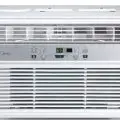Hey! This site is reader-supported and we earn commissions if you purchase products from retailers after clicking on a link from our site.
Life in an RV is full of surprises, and unfortunately, one of the most common of these surprises is finding an excess amount of moisture in your cabin. Left untreated, this moisture can wreak havoc on your RV and be incredibly difficult to fix.
But keeping humidity away doesn’t have to be a struggle. We did the research to find the best RV dehumidifiers to keep your travels dry and happy!
Keep Your RV Moisture Free with These Dehumidifiers
| Best RV Dehumidifiers | Category |
| hOmeLabs 22 Pint Dehumidifier | Most Effective RV Dehumidifier |
| Keystone KSTAD50B Dehumidifier | Best Heavy Duty Dehumidifier |
| InvisiPure Hydrowave Dehumidifier | Best Dehumidifier for Smaller Campers |
| Pro Breeze Mini Dehumidifier | Most Affordable Dehumidifier |
| Eva-dry E-333 Renewable Mini Dehumidifier | Most Energy Efficient Dehumidifier |
Reviews of Our Top Picks
Below are a bunch more details about each of our recommendations.
Most Effective RV Dehumidifier
hOmeLabs 22 Pint Dehumidifier
Covering an area of 1,500 sq. ft., the hOmeLabs 22 Pint Dehumidifier can absorb nearly three gallons of liquid per day. You can set your desired humidity percentage and walk away. The machine will continue to function until it’s met your setting, or the internal tank is filled. You can also take advantage of the timer function to save energy.
There’s never a need to worry about the internal tank overflowing because this dehumidifier shuts itself off when it senses that it is too full of water. General maintenance is simple and includes wiping out the inner tank every two weeks and washing the filter once a month.
At about 30 pounds in weight and nearly 20 inches in height, this dehumidifier is better suited for larger RVs such as Class A and Class B vehicles. The small four wheels at the base of this dehumidifier keep it portable despite its weight. And the 2-year warranty provides a little extra peace of mind in case of accidents.
Pros:
- It dehumidifies and area of up to 1,500 sq. ft.
- It has an automated shut-off function
- It can function on a set timer
- It is easy to keep clean and well-maintained
- It comes with a standard 2-year warranty
Cons:
- It is heavier and more substantial than a typical RV dehumidifier, so it may not be ideal for smaller campers (better recommendation below)
- Produces heat while turned on
- May generate noise if not completely level, or if the filter needs cleaning
Best Heavy Duty Dehumidifier
Keystone KSTAD50B Dehumidifier
A flooded RV is nothing to laugh about. Damage caused by moisture can be complicated to repair. Rust, mold, and mildew can ruin any vehicle, but RVs are particularly prone to excess moisture. Showers, sinks, and the surrounding environment can all contribute to this build-up, and large amounts of humidity require a significant solution.
The Keystone KSTAD50B Dehumidifier can absorb up to 50 pints, that’s a little more than six gallons per day. As someone who has looked down at the floorboards of their vehicle and found an eight-inch-deep puddle of water sloshing about, I can tell you that this dehumidifier is a lifesaver in extreme situations.
While it may not be the best choice for daily use, the Keystone KSTAD50B Dehumidifier can save you time and money should you ever encounter a massive moisture issue in your RV. The full-tank alert and automatic shut-off function make it a simple option for those who’d like to press a button and walk away. However, at 36 pounds in weight, it is more substantial than a standard portable dehumidifier.
Pros:
- It can absorb more than six gallons of water per day
- It has an automatic shut-off function
- It’s easy to clean and maintain
Cons:
- It’s more substantial than a typical portable dehumidifier
- It’s not an excellent choice for daily use
Best Dehumidifier for Smaller Campers
InvisiPure Hydrowave Dehumidifier
Smaller campers have tighter spaces that require space-saving solutions. The InvisiPure Hydrowave Dehumidifier is an excellent option for those with fifth wheels, travel trailers, and van-style campers. Standing at only 9.8 inches tall, this mini dehumidifier is incredibly portable and lightweight, and it can handle an area of up to 300 sq. ft.
Though it may only extract 16-27 ounces of water from the atmosphere per day, small spaces typically do not require a tremendous amount of moisture removal. The auto shut-off function ensures that the tiny tank never overflows. The small tank capacity makes tank removal quick and painless, with little chance of spillage.
Also, this portable dehumidifier generates very little noise or heat. It consumes a small amount of electricity and works perfectly with a 120V power supply. Traveling in a small RV or converted van doesn’t mean you can’t have access to clean, purified, dry air!
Pros:
- Incredibly small and portable
- The automated shut-off function prevents overflows
- Easy to remove and empty the water tank
- Produces very little noise
- Consumes only a small amount of power
Cons:
- Water absorbed per day can vary
Most Affordable Dehumidifier
Pro Breeze Mini Dehumidifier
Portable, practical, and budget-friendly, the Pro Breeze Mini Dehumidifier may be your next go-to travel buddy. Though this dehumidifier can only handle areas of 150 sq. ft. or smaller, it can absorb up to 9 ounces of water from the atmosphere per day, making it an incredibly useful RV dehumidifier.
Because the Pro Breeze Mini Dehumidifier does not contain a compressor, it produces very little noise. Its small stature of 11 inches and low weight of 2.4 pounds ensures that even the smallest camper can spare a little room for this dehumidifier.
With an automated shut-off function, you can let this machine run all day without worrying about a tank overflow. Unfortunately, this dehumidifier begins to exhibit some problems when used in temperatures below 59 ̊F. Those who enjoy RVing in the winter may want to consider a different dehumidifier for cold weather environments.
Pros:
- Budget-friendly option
- Portable and lightweight
- It can absorb up to 9 ounces of moisture per day
- The automated shut-off function prevents overflow
Cons:
- It does not function well at temperatures below 59 ̊F.
- It does not have a timer feature, which would be helpful
Most Energy Efficient Dehumidifier
Eva-dry E-333 Renewable Mini Dehumidifier
No batteries or energy source is required to get the Eva-dry E-333 Renewable Mini Dehumidifier functioning correctly! This small hooked dehumidifier is designed for closets and small spaces, making it an excellent choice for smaller campers.
You can also purchase several of these and place them around the interior of your vehicle for maximum effectiveness. Because these tiny dehumidifiers do not require any power, you can place them anywhere!
This dehumidifier uses silica gel beads to absorb moisture from the surrounding environment. A single device can handle an area of up to 333 cubic feet. The indicator window will change colors when it is time to ventilate the dehumidifier. That’s right, instead of tossing this out when it is full of moisture, you let it dry and use it again! This ability makes the Eva-dry E-333 Renewable Mini Dehumidifier one of the most renewable dehumidifiers around today.
Pros:
- It does not require batteries or an external power source
- Small and compact, features a hook so it can be hung anywhere in your RV, including closets
- Renewable, never needs replacement materials
Cons:
- It is only capable of handling small areas
- It requires several weeks to absorb moisture within the surrounding area fully
Recap: Best RV Dehumidifiers
- hOmeLabs 22 Pint Dehumidifier – Most Effective RV Dehumidifier
- Keystone KSTAD50B Dehumidifier – Best Heavy Duty Dehumidifier
- InvisiPure Hydrowave Dehumidifier – Best Dehumidifier for Smaller Campers
- Pro Breeze Mini Dehumidifier – Most Affordable Dehumidifier
- Eva-dry E-333 Renewable Mini Dehumidifier – Most Energy Efficient Dehumidifier
Buying a Dehumidifier for Your RV: What to Look For
Before choosing an RV dehumidifier, it’s essential to consider some key factors. The perfect dehumidifier for you depends on the size of your RV, how much power your vehicle can spare, and the amount of background noise you’re willing to accept.
Type: Desiccant vs. Refrigerant
Dehumidifiers typically come in one of two varieties: desiccant or refrigerant. Refrigerant dehumidifiers rely on a coil cooling technique that sends all the moisture to a central bucket. On the other hand, desiccant dehumidifiers don’t require a power source – they use a water soaking material that gets rid of moisture in the air.
Refrigerant dehumidifiers are more powerful, but typically come at a higher price with more noise. Desiccant dehumidifiers cost less and have lower noise levels, but are pretty limited in their capabilities. So, consider both options and choose whichever is best for your setup.
Portability and Size
An RV dehumidifier must be portable and small enough to fit into the cabin of the vehicle safely. Every inch of space within an RV matters and dehumidifiers must have unobstructed access to the atmosphere to do their jobs correctly. This means that a dehumidifier should not be stored beneath any furniture or behind any upholstery.
The size of your RV will most likely help you to decide the size of your RV dehumidifier. Those with smaller rigs will do well with smaller dehumidifiers and vice versa.
The Noise Factor
When a dehumidifier is properly functioning, it generates a small amount of noise. This noise is often called a hum or buzz, and it can be annoying over extended periods. An RV in use is typically not a silent creature, but the constant hum of a dehumidifier may prove too much after days on the road.
Generally, smaller dehumidifiers generate less noise, but this is not always the case. Before choosing an RV dehumidifier, be aware of its noise level, and of your tolerance to repetitive sounds.
Dehumidifying Capacity
Once again, the size of your RV becomes a factor when choosing an RV dehumidifier. A larger RV will require a dehumidifier with a larger capacity. A smaller rig will need a dehumidifier with a lower capacity.
Of course, if your fifth wheel or travel trailer is having excessive moisture issues, it may be better to start with a high-capacity dehumidifier and work your way down. However, excessive moisture may be a symptom of a more significant problem, and you should consider checking with your vehicle’s technician or mechanic before choosing an RV dehumidifier.
The more area your dehumidifier can handle, the more water it will contain at the end of each cycle. It is important to remember that though you are removing the dampness from the air, it is not entirely vanished from your vehicle. Large dehumidifiers can be a challenge to empty and can be a spill hazard if left unattended for an extended period.
Choosing a dehumidifier that matches your space size closely is the best way to ensure a successful experience.
Power Source
The amount of energy your RV is capable of generating is one of the most significant factors to consider before buying an RV dehumidifier. Power is precious when you’re out on the road because you’re typically dependent on your RV’s generator for electricity. Be sure to read our guide on how to choose the right size generator if you’re planning on using this as your power source.
Running a power-hungry dehumidifier can spell disaster for anyone hoping to conserve energy. However, choosing a dehumidifier with an automatic shut-off function or a smaller capacity can help you to ensure that your dehumidifier isn’t draining your RV’s power.
Besides, some of the smallest dehumidifiers do not require batteries at all. This makes them an affordable and power-free option for those without a lot of energy to spare.
Have questions? Check out Brian’s article on keeping moisture out of your RV as well, and we put some frequently asked questions below about dehumidifiers too.
Frequently Asked Questions
Should I Run A Dehumidifier In My RV?
Yes, you should absolutely have a dehumidifier in your RV. Dehumidifiers are essential in keeping mold out of your RV and keeping the inside feel like the inside. Reducing the humidity in the air is also healthier for you and anyone else in your RV. Too much humidity especially when it’s cold can lead to sickness.
How Big Of A Dehumidifier Should I Buy?
The size you buy depends on your RV. Larger RVs have more air space and therefore you will need a bigger unit. It is very important that you buy the right size dehumidifier for your living space. Having one too small will not pull enough water out of the air and will be a waste of money. Having one too big, however, is generally not an issue as you can let it grab more water out of the air.
Where Should I Place My Dehumidifier?
The best place to put a dehumidifier in your RV is generally the place where you spend the most time, this would generally be the main room. It has the largest air capacity and most of the time that is where everyone is gathered whether to sleep or to eat. Placing your dehumidifier in this room will likely have the best results for dehumidifying air.





